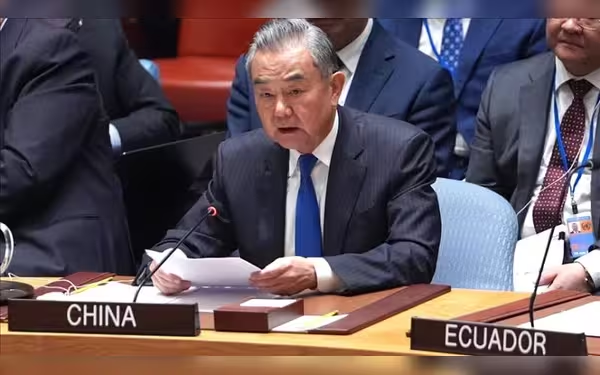Saturday, November 16, 2024 07:29 PM
China's Diplomat Critiques US Human Rights Hypocrisy Amid Mideast Conflicts
- Wang Yi questions US commitment to Muslim human rights.
- US accused of political manipulation of human rights issues.
- China invites dialogue on human rights with all nations.
 Image Credits: nation_pk
Image Credits: nation_pkChina's Wang Yi criticizes US hypocrisy on human rights amid Middle East conflicts, questioning its commitment to Muslim populations.
The ongoing conflicts in the Middle East have sparked intense discussions about human rights, particularly regarding the role of the United States. Recently, China’s foreign minister, Wang Yi, raised significant questions about the apparent double standards exhibited by the US in its approach to human rights, especially concerning Muslim populations. During a meeting with UN human rights chief Volker Turk in New York, Wang pointedly asked, "If the United States cares so much about the human rights of Muslims, why does it continue to provoke or support wars in the Middle East and other regions, causing large numbers of innocent Muslim casualties?" This statement highlights a growing concern that the US may not be as committed to human rights as it claims to be.
Wang's remarks come at a time when the world is closely observing the humanitarian crises resulting from conflicts in the Middle East. He further questioned why the US has not supported Palestine in becoming a full member of the United Nations, despite its professed concern for human rights. This raises an important point about the inconsistency in the US's foreign policy, particularly in relation to the Arab world. Wang emphasized that the US's failure to advocate for a permanent cease-fire and the complete withdrawal of troops from Gaza reflects a lack of genuine commitment to peace and human rights.
Moreover, Wang criticized the "political manipulation" of human rights issues by the US, suggesting that such tactics are becoming increasingly unpopular globally. He argued that many Muslim countries have recognized that the US often uses human rights as a pretext to interfere in the internal affairs of other nations, including China. This perspective sheds light on the complex dynamics of international relations, where human rights can sometimes be weaponized for political gain.
In addressing concerns about China's treatment of Uyghurs in Xinjiang, Wang asserted that these issues are often exaggerated to tarnish China's image. He stated, "The vast majority of Muslim countries have long seen through the tricks of the United States and understand that it is merely using human rights as a pretext to interfere in the internal affairs of China and other developing countries." This assertion reflects China's ongoing defense against accusations of human rights violations, emphasizing its belief in the legitimacy of its policies.
Wang concluded by expressing China's willingness to engage in dialogue with all nations on human rights issues, stating, "China's doors are open to the world, and it welcomes friends from all nations to visit China and see for themselves." This invitation suggests a desire for transparency and a willingness to address concerns through conversation rather than confrontation.
In summary, the discourse surrounding human rights in the context of international conflicts is complex and often fraught with contradictions. As nations navigate these sensitive issues, it is crucial for them to engage in honest dialogue and seek genuine solutions that prioritize the well-being of all individuals, regardless of their nationality or religion. The questions raised by Wang Yi serve as a reminder that the pursuit of human rights should not be selective or politically motivated, but rather a universal commitment to humanity.













